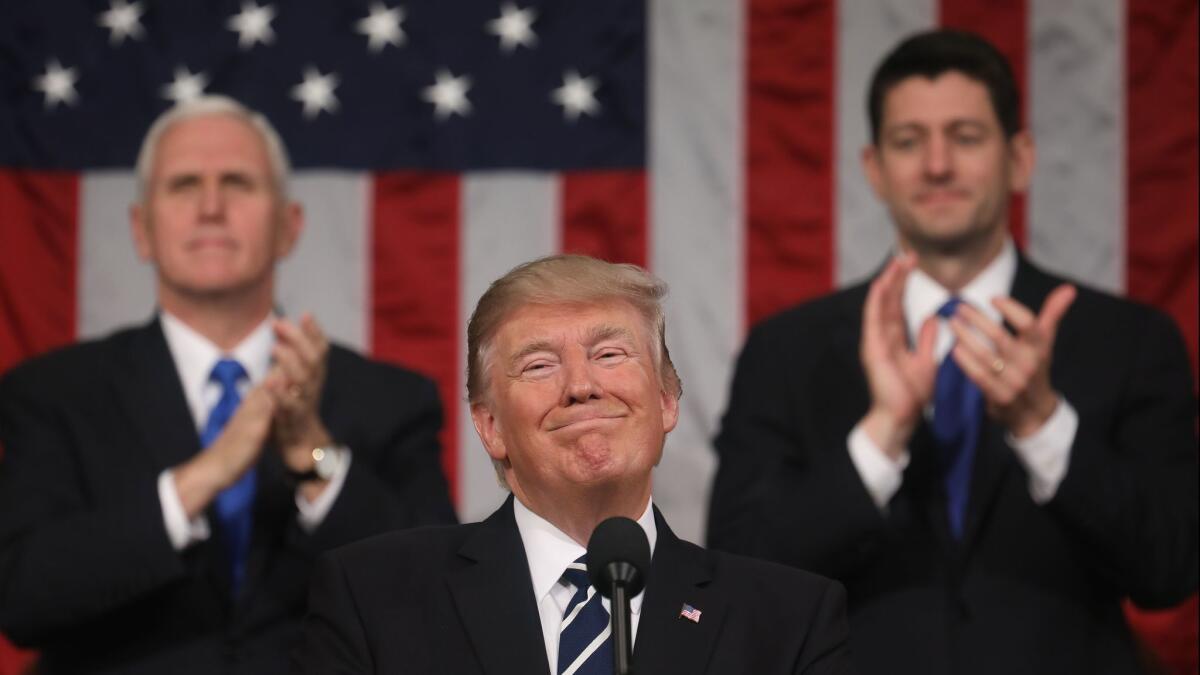Trump’s first State of the Union address: Some things to look for

Reporting from Washington — President Trump is known for breaking norms, but on Tuesday night he complies with a century-old tradition — delivering his first State of the Union address to a joint session of Congress, as well as the Supreme Court, foreign diplomats and a national television audience. Nearly a year ago, he addressed Congress and a prime-time TV audience from the Capitol, but by tradition a president’s first report on the state of the union — based on a constitutional requirement — does not occur until after a year in office.
Trump will boast about the economy, and aides promise an uplifting speech free of the doom and gloom of his inaugural address. Though he will speak from a teleprompter (he once said that should be illegal for presidents), Trump often goes off script. Whether you’re watching on TV or a phone, here are a few things to watch for.
Details, details, details: Because these speeches come early in the year, and have the attention of millions, presidents use them to offer a grab bag of proposals to set the nation’s agenda. Bill Clinton, a policy wonk, famously exhausted his listeners by his lengthy wish list. The best speeches focus on a few priorities, to rally public support and signal to lawmakers what the president really cares about.
Look for Trump to emphasize an infrastructure initiative and his recently unveiled immigration proposals. Those issues offer Trump opportunities to build a bipartisan coalition — in fact, neither is likely to pass without one — yet what Democrats know so far about both proposals leaves them cold. If he emphasizes hard-line immigration restrictions, and too little money for public works, look for Democrats to sit on their hands.
Applause, or the sound of one hand clapping: Democrats will do a lot of hand-sitting, given their antipathy toward Trump. Often the frequent applause will be coming solely from Republicans’ side of the House chamber. Democrats, perhaps many, will applaud occasionally when Trump promotes things they like — infrastructure and immigrants, for instance — or attacks trade deals.
While bipartisan ovations will be hard to spark, a tribute to the troops and the now-traditional introduction of national heroes sitting in the gallery with the first lady usually can get all sides on their feet. Look for the opposite, too — a heckler or protest, more likely from the gallery than the VIP floor.
Speaking of the first lady: Melania Trump has been seen little in public, and not at all with her husband, since the Wall Street Journal reported 18 days ago that a Trump lawyer had paid a porn star $130,000 just before the 2016 election to keep silent about an alleged affair. Subsequently Melania Trump skipped a planned trip with the president to Davos, Switzerland, last week and instead went to their Florida estate.
As late as Monday, her office was offering only tentative assurance that the first lady would attend. Assuming she does, flanked by the White House’s invited heroes, watch her body language and facial expressions.
Pinocchios and pants-on-fire: Professional fact-checkers agree: Trump has told more falsehoods than any president before him. State of the Union speeches normally are well-vetted, unlike Trump’s tweets and off-the-cuff remarks. Yet the president, with staff acquiescence if not encouragement, routinely says things that have been widely debunked. Even official White House releases call the recent tax cuts the biggest in history — and Trump might well do so again in this address. They’re not. Tax cuts under Reagan, Bush and Obama all were larger.
Watch, then, for what Trump advisor Kellyanne Conway has called “alternative facts,” but which fact-checkers call wrong — earning Pinocchios in the Washington Post and Pants-on-Fire ratings from PolitiFact. There almost certainly will be a few.
“Rocket Man” and other diplo-speak: Americans are not the only ones watching. Foreign allies and foes also pay attention — many ambassadors are in the audience — and they’re especially attentive to Trump, whose impulsiveness has rattled capitals around the world.
Trump has used colloquial insults, like “Little Rocket Man” to describe North Korean dictator Kim Jong Un, or a bit of snark, as he did in countering past criticism from British Prime Minister Theresa May, but mostly he does so on Twitter. Yet he also said “Rocket Man” in addressing the United Nations last fall. So look for less-than-diplomatic flourishes or, conversely, watch whether and how Trump talks about strongmen who’ve had his favor, such as China’s Xi Jinping and Russia’s Vladimir Putin.
Putin? Would he go there? Trump speaks at what seems a decisive time in the long-running investigation into Russia’s election interference, the possible complicity of Trump campaign associates and Trump’s own actions potentially obstructing the probe. The special counsel is expected to seek his testimony soon, while pro-Trump House Republicans are investigating the investigators at the Justice Department and FBI.
That makes for perhaps the single biggest look-for in Trump’s speech: Will he talk about the investigation, even say the words Russia and Putin? In 1974, as the Watergate investigation approached its end, a defiant President Nixon said during his State of the Union address, “One year of Watergate is enough.” Nearly six months later, he resigned.
To read this article in Spanish, click here
Twitter: @noahbierman
More to Read
Get the L.A. Times Politics newsletter
Deeply reported insights into legislation, politics and policy from Sacramento, Washington and beyond. In your inbox three times per week.
You may occasionally receive promotional content from the Los Angeles Times.











